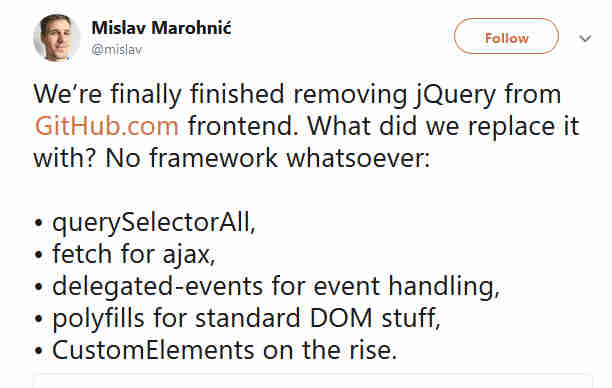| GitHub Removes jQuery. Why? |
| Written by Ian Elliot |
| Wednesday, 01 August 2018 |
|
In an almost super-human effort, GitHub has removed all trace of jQuery from its fontend code. This is interesting, but the real question is why? The most obvious answer is that programming is subject to the same whims of fashion as other technical disciplines - perhaps even more so because change is mostly easy. Perhaps it would be fairer to say that change is notionally easy. We are all subject to the idea that the easiest way to improve a code base is to tear it down and start again. After all, we love creating our code from scratch and hate having to maintain a messy, inherited, code base. Of course, in truth our pristine code soon evolves into the messy inherited code base we have worked so hard to banish. When Google decided to start from scratch with the Chrome browser it was a wondrous thing, but now it is fat, bloated, slow, memory hungry and with a confusing and often stubborn UI. So it is now with the negative reaction to jQuery. If you don't know, and if you don't then this isn't going to make a lot of sense, jQuery was a lifesaver. It provided the standard JavaScript library we all so badly needed. It provided a way of taming the wild west of different browsers and their intentionally different ways of doing things. Instead of having to write browser-specific code you simply wrote to jQuery and mostly it just worked on a range of browsers. Not only did it smooth things over, jQuery provided more advanced capabilities and a whole style of programming in JavaScript. You can thank jQuery and its creators for making fluent function chaining popular, and a whole lot of other JavaScript idioms. You could, and still can, learn a great deal about JavaScript by reading the jQuery code. In fact, being able to understand it easily is good proof that you are a JavaScript programmer and not a "some other language" programmer pretending to know JavaScript. Over time, however, what jQuery was doing seemed to be increasingly irrelevant. As HTML 5 came into view, and browsers started to get their acts into some sort of conformity, so jQuery's smoothing over didn't seem so important. Also CSS added the sort of selectors that jQuery provided and after a while jQuery even adopted native CSS selectors in its sizzle selector engine and added warnings that using non-native selectors would be slower. Does this mean jQuery is redundant? A number of blog posts and even web sites, e.g. http://youmightnotneedjquery.com/ certainly seemed to push the point of view that if you used jQuery to do a job that you could do with HTML/CSS or plain JavaScript, then you were somehow a less-than-good programmer. Slowly but surely the smart guys were in the business of telling the dumb guys that jQuery was old school and deprecated, and so were you if you used it. Certainly there was a new impetus to evaluate the need to include jQuery in a new project, but to rip it out of existing projects? This is madness driven by fashion. GitHub isn't alone in responding to such pressure. BootStrap has removed jQuery from its latest version and it's not alone. The number of frameworks that are abandoning the use of jQuery is likely set to grow, but this isn't quite the same thing as what GitHub has done. Frameworks are reused by lots of people and if they can reduce a dependency then this is probably a good thing. You can always add jQuery if you want to use it along side BootStrap or whatever. However, what GitHub has done is different - we use its code but we don't (in most cases) reuse its code:
The bullet points are interesting. Let's look at them one by one.
While it is true that jQuery isn't a vital as it once was, it is still relevant and extremely useful. So why the backlash? First it has to be the usual fickle flip in fashion. What was once the latest and hottest quickly becomes the most despised. By rubbishing the technology of the existing cohort of developers, the next establishes itself as superior - even if it doesn't have anything better. Another reason is a deep misunderstanding of what jQuery is and does. If you just see it as a long-winded way of writing querySelctorAll then, of course, you think you don't need it. Far too many JavaScript programmers are as shallow as this suggests. Remember the next time you hear someone saying how they don't need jQuery that they are simply revealing how little they know of jQuery. There are many more non-technical reasons for the current rejection of a very reasonable technology, I'm sure you can think of your own. Notice that I'm not criticizing the skills of GitHub's engineers. I'm sure they have done a good job at removing jQuery and what they replaced it with probably has advantages - this is in the nature of reworking things. I am criticizing the political decision to do the job at all. If it ain't broke don't fix it. But we programmers have a deep drive to fix anything that is in the slightest bit "mature". Yes, we see mature code as broken and we tend to call it "legacy". A blank code base is an exciting code base.
More Informationhttps://twitter.com/mislav/status/1022058279000842240 Related ArticlesjQuery 3.2.1 Is Out - Do We Still Care? Microsoft Buys GitHub - Get Ready For a Bigger Devil JQuery And Dojo Foundations To Merge Vanilla JS Used On More Sites Than jQuery To be informed about new articles on I Programmer, sign up for our weekly newsletter, subscribe to the RSS feed and follow us on Twitter, Facebook or Linkedin.
Comments
or email your comment to: comments@i-programmer.info <ASIN:1871962501> <ASIN:1871962528> <ASIN:1871962579> <ASIN:1871962560> < |
| Last Updated ( Sunday, 14 April 2019 ) |





